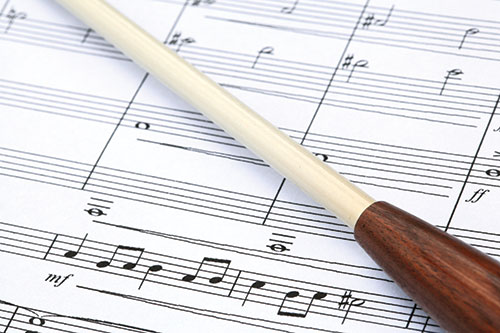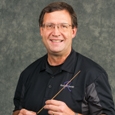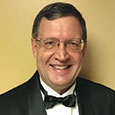When I started teaching in 1985, I had scant knowledge of young concert band literature except for the pieces I had played in junior high school, and even then I could barely remember the titles – Concord Overture, March for Tomorrow, Kensington Overture, and Olivia Newton John’s Greatest Hits were among the few I did. My new band room had a long built-in cabinet with drawers containing ancient, cobwebbed choral books with original melodies by Pope Gregory himself. However, on top of the cabinet were quite a few abandoned reel-to-reel and cassette tapes of past contest performances. Pleased that the previous director was not the sentimental type, I listened to every one of them, gleaning ideas on pieces my band might be able to play at contest the next spring. Along with those tapes, an Arkansas required music list, and advice from more experienced colleagues, I managed to piece together a program for that year.
Not to make it seem like we had it so bad in the old days, but putting together a program of any type these days is easier in many respects than it was 30 years ago. However, many aspects remain exactly the same, and you must understand these to be successful whatever the performance venue.

Know Your Band
Do student opinions matter? I mean, we’re the ones with degrees in music. What do they know? Actually, they know what they like, and that should matter a great deal if we want the best performances from them. That does not mean we should cater to their every musical whim; like a master salesman, one of our tasks is to expand their musical horizons so they not only appreciate, but also enjoy many different types of music. When we succeed, it can be an amazing thing. A couple of years ago I heard some of our choir students practicing a florid piece by Handel. What’s more, they were actually enjoying it. When I thought about the impoverished backgrounds of these kids, it almost brought tears to my eyes. Where else would they learn to like Handel but in a school music program?
Make sure you have the instrumentation for a proper performance. Determine as early as possible – even the previous year if possible – whether there are instrument switches that can be made and extra lessons that should be taught weeks or months ahead of time. You control this more than you think; there is no reason to be stuck with eleven saxophones and one trombone in your ensemble. Students enjoy learning new instruments, and switches are often an easy sell. However, be ready for a little wheeling and dealing if need be. I have promised players if they would play an instrument for a semester, I would never ask them to switch again. Often they like the new instrument so much they want to stick with it. If you get a jazz band program going, that can provide more versatility for switches, as students often have to learn a new instrument to make the instrumentation work for the jazz band.
Mix optimism with a good dose of reality when selecting pieces for contest. Choose music that exploits strengths and either hides weaknesses or challenges weaker sections in a reasonable way. A little group psychology may be in order. Some groups accept challenges, others do not. I am straightforward with different sections of the band, telling them exactly what they need to do help the whole group succeed. They do not want to let their friends down, so it is rarely a tough sell. I set up individual lessons and sectionals to address areas of concern.
Edit parts and provide easier rewrites for weaker players who struggle with technical passages. This is much better than not allowing them to play on large portions of the music.
Another consideration is the maturity of the group and whether it is capable of the concentration a particular piece requires. This is especially true of percussionists. If they would wreak havoc in the dark recesses of the rehearsal room if left alone, perform music that keeps them busy. If you have discipline problems regardless of the music you play, it may be wise to go with technically simpler music choices until you have matters under control. With fewer technical concerns, you will be able to focus more on fundamental but essential aspects of performing like tone, intonation, balance, and expression.
Know the Audience and Occasion
Concerts for parents. A colleague told me he once had a parent come up to him after a concert and say, “When you guys played Do Wah Diddy Diddy it just sent tingles up and down my spine.” Sadly, it’s unlikely that even First Suite in E-flat would have had the same effect, but it underscores the fact that people like what they know, particularly when their baby is playing it. I know this is musically sacrilegious, but every now and then I will have my jazz band pull out a piece in rehearsal and ask them to play the piece about as badly as they can while still keeping it together. We usually have a good laugh over this, and then I’ll ask how many of them thought their parents would still think it was wonderful if we played it like that. Most of them raise their hand; I suppose love overcomes a multitude of wrong notes. All jesting aside, give parents what they want: their kids playing something they can relate to. There are certainly concerts where you will perform contest literature, but avoid the temptation to make other concerts too high-brow. I’ve seen this over and over again at all-region and all-state concerts. Parents cannot relate to any of the music and wonder why they paid for their children’s instruments.
Awards concerts. I give most of our awards at a band banquet and save the more prestigious awards for the concert. This shortens the concert and deserving students avoid receiving only a slight smattering of applause because the audience is in a concert-induced coma. Consider having junior and senior high concerts on different nights or having the high school band perform first on a long night so the young players are there to see where you want them to be one day.
School concerts. Have a principal introduce you and set expectations for behavior. Your students deserve better than an inattentive, unruly audience. Instead of a concert setting, be creative. Go to the people. I’ve had ensembles play in the school cafeteria during lunch. This year, my jazz band played for the junior high movie club. We called the event “Jazz and a Movie.”
Know Proper Pacing
The pacing of most programs should be based on mood. I think the ideal concert program is upbeat in nature with a dash of slow. If I were aiming for that mood, I would choose music that fit the following categories:
1. An upbeat work on the shorter side.
2. A slow and emotional work.
3. Something rhythmic, such as a piece with a Latin American flavor.
4. A flowing and beautiful piece.
5. Something peppy, such as a march.
6. An upbeat movement of a solo feature.
7. Lighter fare, such as a pop selection.
Know Your Plan
Get the whole year’s concert music out as soon as possible, Preferably within a week after marching season ends. Lighter fare for later concerts can provide a break from contest and festival music. Do not spend too much time sightreading music to see what you like and your students can play. Listen to recordings online, and if you know your band, you can get things right the first time. For sightreading, use a sightreading book, such as The Sight-Reading Book for Band, Book 1. (Jerry West; Wingert-Jones Publications).
Know the Dangers
Parents are recording and posting on social media, which has added new meaning to the phrase “a concert only a mother could love.” Now the mothers can share the love all over the world.
With an immature group, think carefully before programming music that is slow from beginning to end. You may find your self with tuning and balance problems from start to finish.
Do not use concert music as your bands’ sole means of musical development, because it can leave some students behind, particularly tuba players and percussionists. Such materials as scale sheets, method books, private lessons, sectionals, and tone development sheets should be used consistently.
Know the school calendar and anticipate interruptions. Schedule emergency rehearsals closer to the event, so you have a back-up plan. I’ve often had an open rehearsal before a concert so parents can see how I work the pieces before we perform them.
Know How Judges Judge
Early in my career I would get hung up on not being given enough credit for the difficulty of a piece when judges determined the final rating. I soon realized, however, that it is impossible to objectively factor that into the scoring. A director should not expect a judge to give a pass on poor intonation or faulty technique just because a work is hard. Whatever you choose to do, you must do it well.
Some states have training sessions for judges. See if you can attend even if you are not experienced enough to judge.
Know the Literature
In some ways, this is more difficult than it was years ago, because there is so much more music to sift through to find high-quality music for your band. Of course, the reliable ways of using state required music lists and recommendations from colleagues is still viable, but now you can view scores online and listen to recordings any time. Facebook pages for band directors are great sources, but use the search function first so you don’t annoy members with requests that have already been posted on the page a dozen times.
A Select List for Young Bands
In past issues I suggested music lists of Halloween selections (September 2017) and novelty tunes (May 2016). Here are some of my favorite grades 1-3 pieces, spanning over thirty years, sorted by composer. It is in no way exhaustive.
Brian Balmages: Colliding Visions (1), Falcon Fanfare (1), Spirit of the Stallion (1), Jungle Dance (2), March Diabolique (2), Among the Clouds (3).
Andrew Boysen: Unraveling (3). This is one of the most exciting pieces for this grade level.
Timothy Broege: Sinfonia Six (3). This is a golden oldie by a composer who thrives on creating interesting tonal colors.
Jack Bullock: Variants (3). I fell in love with this oldie the first time I heard it.
Matt Conaway: Factory Riffs (2).
Elliot Del Borgo: Modal Song and Dance (1), Festive Scenario (2). If you are looking for something with a sound that contrasts with other pieces, his works fit the bill.
John Edmondson: Command March (1). This is my favorite easy march. His Winchester March (1) ranks up there as well.
Henry Fillmore marches arranged by Andrew Balent: His Honor (2), Americans We (2).
Rob Grice: Zeal (1).
Brant Karrick: Cumberland Falls Overture (3), Spy Chase (3)
Bob Margolis: The Two-Minute Symphony (1)
David Shaffer: Excellentia (2), Fire Dance (2), Last Ride of the Pony Express (2), Noble Heritage (march, 2)
Claude T. Smith: A Thousand Hills Overture (2), God of Our Fathers (3).
Robert W. Smith: The Tempest (1). Don’t hand this one out unless you are ready to hear kids play it over and over again to the exclusion of everything else. They love it.
Jared Spears: Adventures (1), Thunder Mountain Overture (1). His percussion ensembles are good as well.
Randall Standridge: Snake Charmer (3).
Hugh Stuart: Three Ayres from Gloucester (3). You will need a good horn section for the second movement.
James Swearingen: Denbridge Way (2), Northpointe Fantasy (2).
Frank Ticheli: Cajun Folk Songs I (3), Fortress (3).
Other good programming possibilities include performing easy arrangements of classic works. I like Palladio, Mvt. 1 by Karl Jenkins, Bolero by Maurice Ravel, arranged by Jay Bocook), Ye Braes and Banks of Bonnie Doon by Percy Grainger, arranged by Michael Sweeney, Salvation is Created arranged by Michael Brown, and Shepherd’s Hey by Percy Grainger, arranged by Chip De Stefano.
Solo features are another great way to add variety to a concert. I sometimes divide up a work by phrases and feature two players.
Consider a commission project. Prices can vary greatly, but you can find a reasonable price if you seek out an up-and-coming composer, because in some ways they need you as much as you need them. Either way, have a specific idea of what you want so you don’t get stuck with a cookie-cutter piece the composer was going to write anyway. For more expensive composers, contact them as soon as possible and schedule some fundraisers so everyone to perform the piece contributes toward the project.
Conclusion
Selecting music that is appropriate for all audiences and shows your band in its best light takes more than just a cursory look through the band library and the latest publisher recordings. With thorough planning and foresight, your program will give even the toughest critics a tingle up and down their spine when they hear it.






